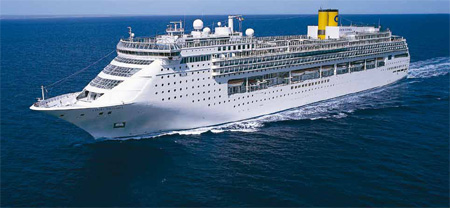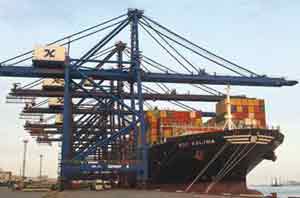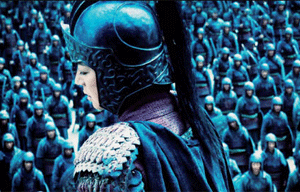Legendary alliance
Updated: 2011-10-28 09:26
By Wang Chao (China Daily)
|
|||||||||
|
Wang Zhonglei, president of Huayi Brothers Media Corporation, says the company expects to gain better recognition overseas through the co-production alliance with Legendary. Jiang Dong / China Daily |
Huayi set to make big strides on global stage with Hollywood venture
After harvesting lucrative returns from the Chinese box office, Huayi Brothers Media Corporation (Huayi), the biggest private entertainment company in China by revenue, has made the next big stride in its steps to establish a global presence.
In August, the company established a joint venture company with US-based Legendary Pictures for making "hybrid films".
The new venture, Legendary East, will look to tell Chinese stories in Hollywood language, says Wang Zhonglei, president of Huayi. The company plans to make one or two hybrid films next year, with the first subject being the Great Wall of China.
"By forming this partnership, we plan to be involved in the entire production process and also learn from our Hollywood partners," Wang says. "It's like moving a school into our company."
Wang Zhonglei and his elder brother Wang Zhongjun, the current chairman, set up Huayi in 1994. The company listed in Shanghai in 2009.
Famous for its films screened during the Spring Festivals, mostly comedies, Huayi netted revenue of 1.07 billion yuan ($168.2 million, 122.7 million euros) in 2010 and became the most profitable private entertainment company in China.
Although the cooperation with Legendary stirred up a buzz among industry peers, Wang says Huayi's international efforts started long before that. "From 2001, we teamed up with Columbia Pictures for over three years to work on films like Big Shot's Funeral, Warriors of Heaven and Earth, and The Missing Gun."
In subsequent years, Huayi teamed up with several other Hollywood companies, but was still excluded from production. Instead, it was given responsibilities like being in charge of distribution in China.
"We want to take the co-production alliance to an altogether different level," Wang says.
"After 10 years of efforts, Huayi has achieved strengths in distribution channels, professional networks and, more importantly, creativity. Now it is time for us to go further."
Wang says Huayi chose Legendary because it was "an avant-garde Hollywood film producer with distinct style and accurate positioning". Such attributes are "especially appropriate to tell traditional Chinese stories", he says.
Legendary has already produced several international blockbusters such as Clash of the Titans, The Dark Knight and Inception.
But Wang admits that most of the co-productions till date in the mainland have been confined to partners from Taiwan and Hong Kong.
In 2010, of the 42 co-production films approved by the government, less than 10 were done with film producers from the US and Europe.
Wang says that one reason why foreign companies are careful about making major investment in China is that despite the impressive box office takings, it still has a long way to go before it can catch up with the US market.
Box office revenue in China was 10 billion yuan last year, or about 15 percent of that in the US. "Hollywood directors will not switch focus to the Chinese market immediately, so we have to reach out for them," Wang says.
Deng Meng, director of cooperation and contracts at China Film Group Corporation, says that Chinese films, including those produced by Huayi, still have a long way to go before real "internationalization".
"Most Chinese films appear only at overseas film festivals, rather than in cinemas where foreign audiences will buy tickets to watch them," Deng says, "This is not real globalization.
"A real international film should be viewed and accepted by ordinary audiences, like Avatar and The Mummy. When foreign audiences are willing to pay money to watch a Chinese film, we can say we have made strides in the international market."
Given the fact that most of the Chinese film companies are unable to match up to their Hollywood counterparts, Deng feels co-production is the best way of gaining access to overseas audiences.
"Due to cultural differences, Chinese films produced domestically might not be accepted by foreign audiences. But if we tell Chinese stories from foreigners' perspective, it will certainly make a difference."
Wang echoes similar views, but feels that the mission to go global is not an easy task as awareness about Chinese films is virtually non-existent in the US and Europe.
Among the top five films in France, the top three are usually locally produced, followed by one or two Hollywood blockbusters. Chinese films have never appeared in the top 10 list.
"Some Chinese entrepreneurs are screening Chinese films in US community cinemas, but the scale is very small. For example, around 6,000 to 10,000 screens are showing Hollywood films, while only 20 are screening Chinese ones."
Wang says that co-production will enrich the quality of films and help them gain wider recognition overseas because they will come with a Hollywood label.
"We need to respect each other's opinion during co-production, so that the two companies can integrate; but at the same time, we need to build up our own strength and influence, so that we can have a bigger say in the entire process."
Peter Sallad, an independent producer from Hollywood, says that apart from cultural difference, the lack of promotion is another barrier that inhibits Chinese films overseas.
"Most Chinese film companies don't even have the budget for overseas promotion. They expect the film to get famous in film festivals, but don't spend any money on promoting it to foreign audiences."
Sallad says that though "co-production is a good approach, promotion is equally indispensable".












